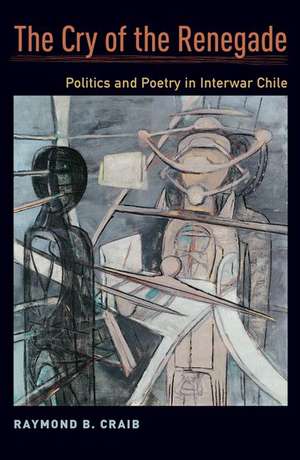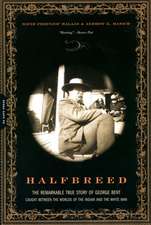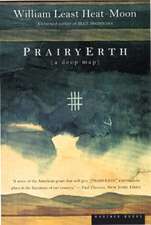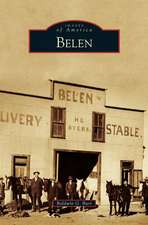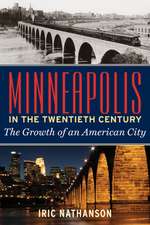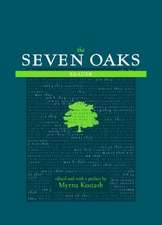The Cry of the Renegade: Politics and Poetry in Interwar Chile
Autor Raymond B. Craiben Limba Engleză Paperback – 30 mai 2019
| Toate formatele și edițiile | Preț | Express |
|---|---|---|
| Paperback (1) | 153.09 lei 10-17 zile | |
| Oxford University Press – 30 mai 2019 | 153.09 lei 10-17 zile | |
| Hardback (1) | 322.41 lei 31-38 zile | |
| Oxford University Press – 15 sep 2016 | 322.41 lei 31-38 zile |
Preț: 153.09 lei
Preț vechi: 183.24 lei
-16% Nou
Puncte Express: 230
Preț estimativ în valută:
29.31€ • 30.46$ • 24.30£
29.31€ • 30.46$ • 24.30£
Carte disponibilă
Livrare economică 06-13 ianuarie 25
Preluare comenzi: 021 569.72.76
Specificații
ISBN-13: 9780190053789
ISBN-10: 019005378X
Pagini: 290
Ilustrații: 51 illus.
Dimensiuni: 236 x 160 x 20 mm
Greutate: 0.5 kg
Editura: Oxford University Press
Colecția OUP USA
Locul publicării:New York, United States
ISBN-10: 019005378X
Pagini: 290
Ilustrații: 51 illus.
Dimensiuni: 236 x 160 x 20 mm
Greutate: 0.5 kg
Editura: Oxford University Press
Colecția OUP USA
Locul publicării:New York, United States
Recenzii
Raymond Craib's rendering is quite novel
His book will interest scholars working on twentieth-century Chile, anarchism in Latin America, and student movements in general....[A] compelling narrative....Craib's book provides a more humanized and quotidian account of real people struggling for their right to a just salary, education, free speech, and mobility within and among nation-states....[A] beautifully written story of the alliance among students and workers during the 1920s in Santiago....We need more books like this; books focused on real activists with multiple needs, desires, frustrations, and interests; stories anchored in the streets in which anarchists walked and marched, spaces that were contested, disputed, and challenged by insolent actions and subversive words.
Craib succeeds in painting a vivid picture of the lived experience of these creators of Santiago's 'capacious left' in 1920. With 52 illustrations including photographs, detailed maps, and periodical reproductions, a narrative structure organizing each chapter around a different individual story, and an evocative, almost poetic narrative voice, the book can place the reader amid the blocks of anarchist Santiago, allowing him or her to imagine its shoemakers, printers, and students living, arguing, and agitating in the streets.
Craib's rich and compelling stories and insights together stand as a significant contribution to what is a thin Chilean historiography on a period during which class conflict intensified, the old elite saw its commanding grip on politics slip away, and student groups, anarchists, and other emergent forces claimed spaces in the public sphere and on the streets....[It] will appeal to scholars and students interested in politics, ideology, class conflict, labor, student organizations and mobilization, and nationalism. Craib's writing is lively and often poetic, tying together the life stories of the study's main actors, and the discourses, institutions, and events that shaped their world....Provides us a deeper and more nuanced understanding of episodes with far-reaching implications in twentieth-century Chilean society, politics, and collective memory.
The link Craib makes with the transnational aspect takes the book from the details of what was happening in Santiago in a particular moments in time and puts it in context, giving a sense and perspective to the decision making of the authorities and the discourses and speeches of those considered subversive.
Craib's narrative is both simple and elegant, at the same time Reading this book is nothing short of a joy. His style is engaging and it is indeed very difficult to put the book down while you start reading it. He brings together with great skill cultural commentary, with history, sociological insights, and anthropological concerns, blending it all into a narrative that flows steadily. Although this is a book about a particular time and place populated by people who make sense in this very specific context, it has much to teach radicals today facing similar challenges. As such, this is more than a history book and becomes a companion to people who are trying to change the world.
Through a deep, moving, historically embedded homage to Chilean student, poet, and rebel Gómez Rojas, Craib illuminates an entire epoch of emancipatory fervor, circulating internationally but solidly rooted in the lived experience of Santiago. Very, very rarely is history so vivid, closely documented, passionate, and, above all, alive.
Craib uses the life and death of an anarchist poet, his friends and comrades, as a window on an era, a city, a country, and a movement. This is a luminous book, hard-hitting and incisive, but also eloquent and nuanced, at once an evocative account of everyday anarchism and a portrait of the 'capacious left' of the post-World War I years, when students and workers joined together to protest social injustice.
Approaching anarchism not so much as an ideology or a movement, but rather as a personal and collective disposition to what he terms 'insolence,' Raymond Craib explains brilliantly what drew people to anarchist ideas and forms of activism. A rich and compelling narrative history that marshals, effortlessly, economic, social, and political history and an impressive range of sources, he Cry of the Renegade sheds new light on a pivotal moment in Chile's modern history while making a major and highly original contribution to the comparative study of anarchism.
Raymond Craib's wise and informative book narrates the violence
Honorable Mention, Southern Cone Book Prize of the Latin American Studies Association
Through the detail of the exploits and persecution of Gomez Rojas and scores of his fellow activist intellectuals...Craib expertly delves into the multiple, interweaving histories of Chile during the inter-war period: student organising; the anarchist movement; state violence; immigration and labour laws; the 'social question'; Santiago's prison system; and Chile-Peru relations....Throughout, the author makes clear that the history he is telling is a fundamentally transnational one....In sum, this book will appeal to historians working in many different areas: Chilean history, Latin American history, urban history, labour history, intellectual history, transnational history and more.
In his impassioned and deeply researched book, The Cry of the Renegade, Raymond B. Craib brings alive the roiling streets of Santiago in the interwar years. ... Craib tells a romantic story of martyrdom, while always being especially careful not to romanticize it, and of how a kind of radicalism of another era tried to face down a world looking far too much like our own ... without ever falling into the traps of presentism. ... At the same time, he provides a compelling and complex account of anarchism, which is far more attractive, far more radical, and far more open -- especially to other currents in the 'capacious Left' -- than any presented by its current acolytes in geography.
His book will interest scholars working on twentieth-century Chile, anarchism in Latin America, and student movements in general....[A] compelling narrative....Craib's book provides a more humanized and quotidian account of real people struggling for their right to a just salary, education, free speech, and mobility within and among nation-states....[A] beautifully written story of the alliance among students and workers during the 1920s in Santiago....We need more books like this; books focused on real activists with multiple needs, desires, frustrations, and interests; stories anchored in the streets in which anarchists walked and marched, spaces that were contested, disputed, and challenged by insolent actions and subversive words.
Craib succeeds in painting a vivid picture of the lived experience of these creators of Santiago's 'capacious left' in 1920. With 52 illustrations including photographs, detailed maps, and periodical reproductions, a narrative structure organizing each chapter around a different individual story, and an evocative, almost poetic narrative voice, the book can place the reader amid the blocks of anarchist Santiago, allowing him or her to imagine its shoemakers, printers, and students living, arguing, and agitating in the streets.
Craib's rich and compelling stories and insights together stand as a significant contribution to what is a thin Chilean historiography on a period during which class conflict intensified, the old elite saw its commanding grip on politics slip away, and student groups, anarchists, and other emergent forces claimed spaces in the public sphere and on the streets....[It] will appeal to scholars and students interested in politics, ideology, class conflict, labor, student organizations and mobilization, and nationalism. Craib's writing is lively and often poetic, tying together the life stories of the study's main actors, and the discourses, institutions, and events that shaped their world....Provides us a deeper and more nuanced understanding of episodes with far-reaching implications in twentieth-century Chilean society, politics, and collective memory.
The link Craib makes with the transnational aspect takes the book from the details of what was happening in Santiago in a particular moments in time and puts it in context, giving a sense and perspective to the decision making of the authorities and the discourses and speeches of those considered subversive.
Craib's narrative is both simple and elegant, at the same time Reading this book is nothing short of a joy. His style is engaging and it is indeed very difficult to put the book down while you start reading it. He brings together with great skill cultural commentary, with history, sociological insights, and anthropological concerns, blending it all into a narrative that flows steadily. Although this is a book about a particular time and place populated by people who make sense in this very specific context, it has much to teach radicals today facing similar challenges. As such, this is more than a history book and becomes a companion to people who are trying to change the world.
Through a deep, moving, historically embedded homage to Chilean student, poet, and rebel Gómez Rojas, Craib illuminates an entire epoch of emancipatory fervor, circulating internationally but solidly rooted in the lived experience of Santiago. Very, very rarely is history so vivid, closely documented, passionate, and, above all, alive.
Craib uses the life and death of an anarchist poet, his friends and comrades, as a window on an era, a city, a country, and a movement. This is a luminous book, hard-hitting and incisive, but also eloquent and nuanced, at once an evocative account of everyday anarchism and a portrait of the 'capacious left' of the post-World War I years, when students and workers joined together to protest social injustice.
Approaching anarchism not so much as an ideology or a movement, but rather as a personal and collective disposition to what he terms 'insolence,' Raymond Craib explains brilliantly what drew people to anarchist ideas and forms of activism. A rich and compelling narrative history that marshals, effortlessly, economic, social, and political history and an impressive range of sources, he Cry of the Renegade sheds new light on a pivotal moment in Chile's modern history while making a major and highly original contribution to the comparative study of anarchism.
Raymond Craib's wise and informative book narrates the violence
Honorable Mention, Southern Cone Book Prize of the Latin American Studies Association
Through the detail of the exploits and persecution of Gomez Rojas and scores of his fellow activist intellectuals...Craib expertly delves into the multiple, interweaving histories of Chile during the inter-war period: student organising; the anarchist movement; state violence; immigration and labour laws; the 'social question'; Santiago's prison system; and Chile-Peru relations....Throughout, the author makes clear that the history he is telling is a fundamentally transnational one....In sum, this book will appeal to historians working in many different areas: Chilean history, Latin American history, urban history, labour history, intellectual history, transnational history and more.
In his impassioned and deeply researched book, The Cry of the Renegade, Raymond B. Craib brings alive the roiling streets of Santiago in the interwar years. ... Craib tells a romantic story of martyrdom, while always being especially careful not to romanticize it, and of how a kind of radicalism of another era tried to face down a world looking far too much like our own ... without ever falling into the traps of presentism. ... At the same time, he provides a compelling and complex account of anarchism, which is far more attractive, far more radical, and far more open -- especially to other currents in the 'capacious Left' -- than any presented by its current acolytes in geography.
Notă biografică
Raymond B. Craib is Professor of History at Cornell University. He is the author of Cartographic Mexico: A History of State Fixations and Fugitive Landscapes.
